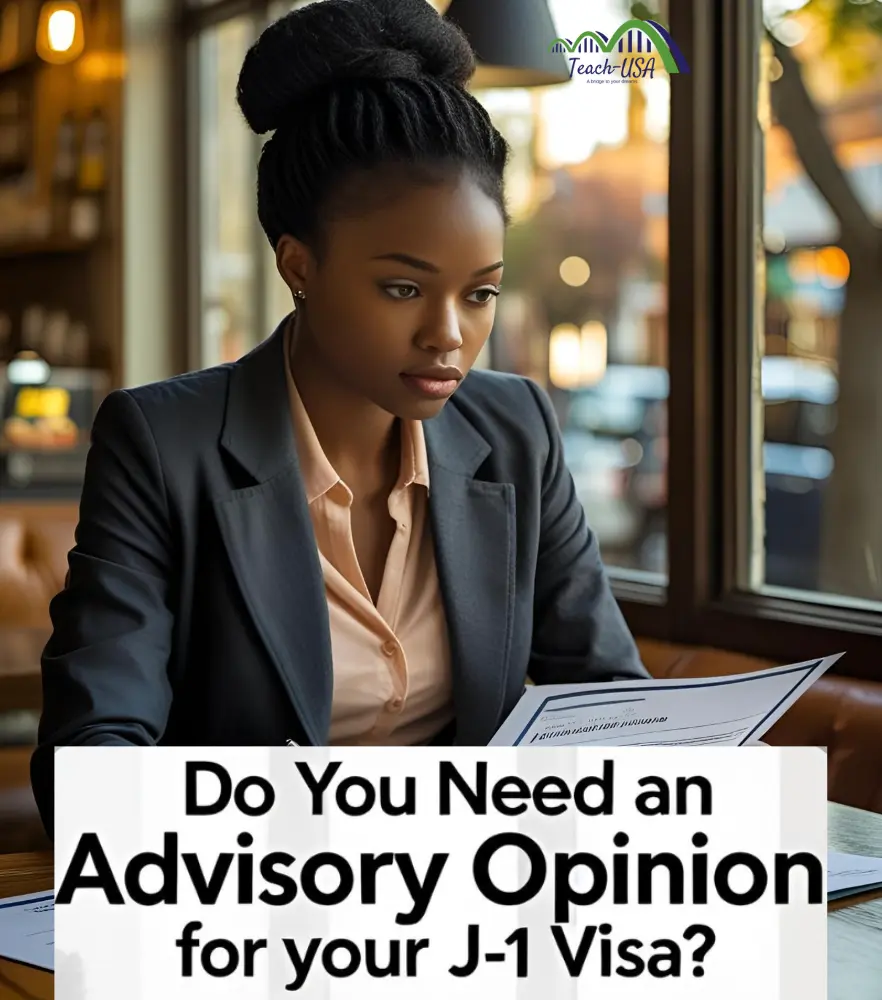If you’re a J-1 visa holder with questions about your 212(e) two-year home residency requirement, you’re not alone. Some teachers and professionals find that their visa stamp says they are subject to the rule—even when newer policies or their specific category suggest otherwise.
So how do you know for sure?
This is where a formal Advisory Opinion from the U.S. Department of State comes in.
What is an Advisory Opinion?
An Advisory Opinion is a written statement issued by the U.S. Department of State. It officially confirms whether you are subject or not subject to the two-year home residency requirement (212[e]) based on your J-1 program and visa history.
It is not a waiver—you’re not asking them to lift the rule. You’re simply asking for clarification.
When Should You Request an Advisory Opinion?
Here are the most common reasons to request one:
✅ Your visa says you’re subject to 212(e), but you believe you are not based on recent policy changes (e.g., India exemption as of January 2025).
✅ You’re unsure whether your program category, source of funding, or country of origin makes you subject.
✅ You’re applying for a waiver or a change of status and need formal proof of whether the 212(e) rule applies.
✅ You’re planning future immigration steps (H-1B, green card, etc.) and need clarity for long-term planning.
What Happens If You Don’t Request One?
If you’re unsure whether you’re subject and proceed with a visa change or waiver application without clarification, you risk delays, denials, or wasted time and money.
An advisory opinion can give you peace of mind—and may help avoid unnecessary steps.
Does Requesting an Advisory Opinion Affect Your J-1 Visa?
No, it does not affect your current J-1 visa status.
Requesting an advisory opinion is completely safe and non-binding. You’re simply asking the U.S. Department of State for an official determination about whether the 212(e) home residency rule applies to you.
- It does not cancel, change, or update your current visa.
- It does not notify your sponsor or affect your ability to remain in the U.S.
- It’s a private, informational process meant to give you clarity for future planning.
Even if the advisory opinion says you are subject to 212(e), nothing happens automatically. It’s just information you can use to make smart, timely decisions—especially if you plan to change visa types, adjust status, or apply for a waiver in the future.
How to Request an Advisory Opinion: Step-by-Step
Here’s exactly how to do it:
1. Prepare the Following Documents:
- ✅ Form DS-3035 (select “Advisory Opinion”)
- ✅ Copy of your J-1 visa page from your passport
- ✅ All copies of Form DS-2019 ever issued to you
- ✅ Copy of your passport ID page
- ✅ Cover letter explaining why you’re requesting the opinion (simple explanation is enough)
2. Fill Out Form DS-3035 Online
Go to:
🔗 https://j1visawaiverrecommendation.state.gov
- Choose “Advisory Opinion” (not waiver)
- Fill out the form completely
- You will receive a barcode cover sheet after submission
3. Print and Mail Your Application Packet
Your packet should include:
- Barcode cover sheet
- Printed DS-3035
- Supporting documents listed above
- Cover letter
📬 Mail to the address on the barcode sheet.
For most, it will be:
U.S. Department of State – Waiver Review Division
P.O. Box 979037
St. Louis, MO 63197-9000
USA
For courier services (FedEx/UPS), use the alternate address provided on the DS-3035 confirmation page.
What to Expect After You Submit
- ⏳ Processing usually takes 4 to 6 weeks
- 📨 You’ll receive an official letter by mail or email confirming whether you are subject or not subject to 212(e)
Final Tips Before You Submit
- Don’t skip this step if your long-term plans involve an H-1B or green card.
- Be honest and clear in your cover letter.
- If in doubt, it’s better to ask now than to correct mistakes later.
Need Help?
If you’re unsure how to prepare your documents or want someone to review your advisory opinion request, we’re here to help. Send us a message and we’ll guide you through the process. Email: apply@teach-usa.net.

